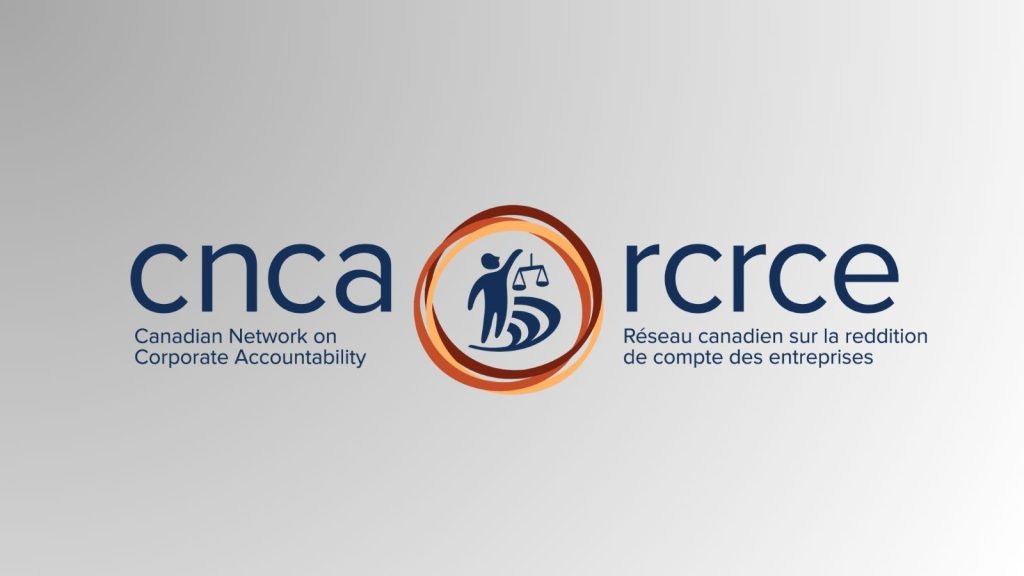The CNCA saw the Government of Canada’s International Assistance Review (2016) as a critical opportunity for Canada to move beyond a narrow focus on international assistance to a whole-of-government approach that places priority on development goals and champions human rights across all of Canada’s global engagements, commitments, and agreements.
Corporate accountability for Canada’s extractive sector operating abroad is a necessary complement to a Canadian human rights based approach to international assistance. The submission by the CNCA makes the case for corporate accountability measures to be included in Canada’s international development policy. Several of CNCA member organizations also made submissions that more fully explore related issues such as beneficial ownership, development-deficits associated with mineral exploration and the gendered impacts of mining.
Introduction to the Submission
Formed in 2005, the Canadian Network on Corporate Accountability (CNCA) unites 30 environmental and human rights NGOs, religious organizations, labour unions, and solidarity groups1 who have joined together to ensure that the fundamental rights of all peoples are respected by Canadian mining, oil and gas companies, no matter where they operate. Many of our member organizations have been working on the issue of corporate accountability for decades and have longstanding relationships with communities, workers, Indigenous peoples, and environmental and human rights defenders from around the world.
We welcome the Government of Canada’s International Assistance Review and the opportunity to make a submission. We are among the groups that advocate policy coherence around a rights agenda and Canada’s international human rights obligations. We see this review as a critical opportunity for Canada to move beyond a narrow focus on international assistance to a whole-of-government approach that places priority on development goals and champions human rights across all of Canada’s global engagements, commitments, and agreements. Although largely absent from the Minister of International Development’s Discussion Paper, corporate accountability for Canada’s extractive sector operating abroad is a necessary complement to a Canadian human rights based approach to international assistance. Below we make the case for corporate accountability measures to be included in Canada’s international development policy. Several of our member organizations are also making submissions that will more fully explore related issues such as beneficial ownership, development-deficits associated with mineral exploration and the gendered impacts of mining.
It’s important to note that the policy and legal reforms described below would have important long term benefits for Canadian extractive companies. Extractive projects frequently create conflict and result in community grievances. When the underlying issues are not addressed fairly and quickly, conflict escalates and companies risk significant operating delays and interruptions with serious financial repercussions. Conflicts that create negative images and publicity for companies become significant liabilities not only for the companies involved but for the entire industry as it seeks to negotiate with rights holders for access to new raw material deposits. A robust system of corporate accountability would contribute to a more stable and predictable operating environment where the responsible business practices of Canadian companies are recognized and rewarded.
Summary of recommendations to the Government of Canada
- Advance new corporate accountability mechanisms in Canada to prevent harm and offer remedy to foreign victims of rights violations. Specifically, Canada should create an independent Ombudsperson for the extractive sector and facilitate access to Canadian courts for those who have been harmed by the international operations of Canadian companies.
- Develop a human rights and Indigenous rights centred Corporate Accountability Strategy for Canada. Unlike the Corporate Social Responsibility (CSR) Strategy created by the previous government in 2009 and updated in 2014, a Corporate Accountability Strategy would focus on the rights of vulnerable individuals and communities and promote the long term success of Canadian companies in their overseas operations. The Corporate Accountability Strategy must prioritize prevention of harm, the right of Indigenous peoples and affected communities to determine their own development strategies, the creation of effective accountability mechanisms, and access to remedy for those who have been harmed.
Conclusion
Canada is a global leader in mineral exploration, with over fifty per cent of the world’s mining and mineral exploration companies headquartered here. Forty per cent of the world’s mineral exploration capital is raised on Canadian stock exchanges. Given the concentration of the global mining industry in this country, Canada is uniquely positioned to become an international leader in corporate accountability. Our ability to be seen as a leader in international human rights depends on decisive and immediate action in this area.
Canada must implement a comprehensive Corporate Accountability Strategy. The recommendations outlined here are the essential elements of such a framework. Binding regulations are required to prevent the most serious offences. Access to both Canadian courts and an independent Extractive Sector Ombudsperson is an urgent priority, particularly for abuses committed in countries with weak judicial systems. Institution of robust and transparent mechanisms to condition government support to extractive companies on respect for human rights, labour and environmental standards, as well as a withdrawal of existing support from non-compliant companies, is crucial for the Government of Canada to avoid complicity in abuses associated with its clients. Capacity building of local communities and civil society is a necessary complement to promote and protect rights. Mandatory transparency mechanisms and a commitment to combatting the financial secrecy afforded by tax havens, which prevents both Canada and developing countries from receiving their fair share of taxes and royalties, are crucial to an effective Corporate Accountability Strategy.
Initiatives that provide for multi-stakeholder dialogue with key government departments, industry and civil society organizations are key to finding ways to institute mandatory corporate accountability measures. Frequent and meaningful consultation with the Canadian public and Canadian civil society organizations is essential throughout the development and implementation of a Corporate Accountability Strategy.
An essential first step and bold move for Canada in 2016 to proclaim its respect for human rights is the establishment of an independent Extractive Sector Ombudsperson office and increased access to Canadian courts for foreign victims of corporate abuse.




